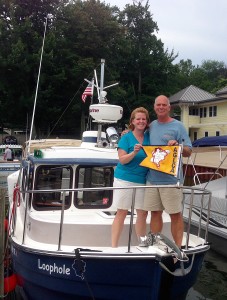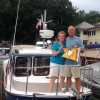 Taking a year off and circumnavigating the waterways of eastern North America isn’t the typical path to renewal, but for Mary Ellen Kettelhut it has marked a sea change in her perspectives on life, and work, and what really matters.
Taking a year off and circumnavigating the waterways of eastern North America isn’t the typical path to renewal, but for Mary Ellen Kettelhut it has marked a sea change in her perspectives on life, and work, and what really matters.
For those who don’t know, the Great Loop is a boating voyage undertaken by about 250 brave boaters per year (this number is on the rise as baby boomers retire and set out for a post-work life adventure). It’s a 6,000 mile trip over inland waterways in the eastern US and Canada. “Loopers” set their course in search of the 70 degree day and a safe harbor each night, and whatever portion of the waterway journey will provide that.
It’s no vacation, and it’s not about enjoyment exactly. Instead, it’s pure adventure testing patience, skill, roles, capabilities, and the ability to surrender and deal with uncertainty. Mary Ellen says it was a welcome detox and reprogramming from her previous 29-year, hard-driving corporate persona.
Corporate America tends to convince us that we can and should be in control as we drive for results. We push against things, but stress builds when there are factors we can’t overcome like broader economic patterns, a bad financial year, competitor actions, or teams that shift and change. In this environment, we become convinced that we can be purely responsible for outcomes and effectiveness – and we’re rewarded for this kind of pseudo control.
The Great Loop is the opposite. Mother Nature is in control and you just have to surrender to her.
Mary Ellen and her husband Kurt had always planned a Great Loop excursion — in a few years — but when Mary Ellen left her job in the fall, the time was right to just go. It was the perfect alignment of circumstances: they are healthy, their parents are healthy, their kids were launched into first jobs and college. The time couldn’t have been better. They jumped onto their 25’ tug boat, aptly named Loophole, and headed out.
It wasn’t like they were totally disconnected. They usually had access to all the requisite social media[i] and email, but they clearly wouldn’t be following a traditional lifestyle for the next 10 months. Mary Ellen’s parents thought they were crazy while Kurt’s cheered them on. Their children were supportive (and actually rather nonplussed). For Mary Ellen, it was the biggest, craziest risk she’d ever taken as she anticipated losing touch with all that had shaped her up to that point. After 10 months, she reflected on her experience and insights.
- Patience was the biggest lesson Mary Ellen learned. Since you’re no longer in control, you have to learn to be patient and let go. It’s stressful and it’s a learning process. Every single day is a new adventure since every single day you’re in a new place, seeing new things, navigating new waters, and meeting new people.
- Staying open to possibilities was also important in the journey. One woman they met along the way invited them to join her family for Christmas dinner. On another occasion, they were warmly welcomed by the cleaning staff at a hotel who helped them find their way into port in Savannah and the music festival where they were able to hear Luciana Williams. In another city, a gentleman from Ghana gave Mary Ellen a really special bracelet he had made.
- Figuring out how to be successful together was also a big deal. Up until this point, Mary Ellen had always worked in corporate marketing positions and Kurt had stayed home to be a full time dad and run the household. On their boat, everything changed. Kurt took charge of all things boating and navigation and Mary Ellen took on the more traditionally domestic chores like laundry, dishes, and cooking. This was a reversal for them but communication and having a common goal were key. Mary Ellen said that the greatest guideline was to be kind. Naturally, there were frustrations and annoyances, but being kind was the first rule of surviving and thriving together.
- The biggest surprise for Mary Ellen? How little you can live with, compared to the ways we normally live our lives. She and Kurt went through three pairs of boat shoes each, but beyond that, their needs were meager. However, being away from family was the biggest struggle. While Mary Ellen didn’t get ‘home-sick’, she did get ‘family-sick’ as in missing her children, her parents and her in-laws. Many hours and miles away, it became more clear than ever that family is where time is best spent.
The trip was a brilliant learning experience and one of the greatest lessons was the ability to live with uncertainty – of relaxing into uncertainly. This ability to unwind tightly wired habits and ‘relax into whatever is happening’ is a life lesson. Mary Ellen only wishes she’d learned it sooner – but really all that she’s been through up until now has perfectly prepared her for The Great Loop.
And now she’s back and onto her next career adventure as a marketing and career consultant at Kettelhut Consulting. She and Kurt have put the boat up for sale, but the experience they’ve had, and the lessons they’ve learned, they will harbor forever.
[i] Here’s a link to Mary Ellen’s blog.
Would you like to tell your story? If so, let me know by emailing me at tbrower108@gmail.com. Why? One of the foundations of Bringing Work to Life is abundance: the idea that it is possible to find fulfillment, have it all, and avoid the trade-offs between work and life. After all, work and life aren’t separate things to be placed in containers, but part of an integrated whole of a satisfying life. Another foundation of Bringing Work to Life is the idea of multiple right answers. As we’re all seeking ways to bring work to life – and bring life to work – we can learn from each other’s unique solutions and stories. I’d love to learn about your story!
Tracy Brower is the author of Bring Work to Life by Bringing Life to Work: A Guide for Leaders and Organizations.

